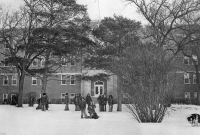Support strong Canadian climate journalism for 2025
A report by the independent ombudswoman hired by the Montreal Roman Catholic archdiocese to investigate allegations of abuse and other inappropriate behaviour says 45 complaints have been filed against the church since her mandate began in May.
In a report made public Thursday, Marie Christine Kirouack said 26 of the complaints are related to abuse, including 22 of a sexual nature. Another 13 concern issues between employees and clergy members, while six involve miscellaneous issues such as upkeep of cemeteries.
Kirouack said the complaints relate to events that took place from the 1950s to the present day, with most occurring before the mid-1970s.
She said the age of the alleged victims at the time of the incidents ranged from elementary school age to over 80 years old, but what they have in common is that all have suffered from the consequences of the abuse.
"In some cases, they have taken refuge in addiction, in others low self-esteem has led to their having abusive partners. Others have experienced great times of depression or anxiety," she wrote.
All of them, she added, "were left with images in their minds that they would like to get rid of whether they had been denigrated, beaten or sexually abused."
Kirouack was appointed in May following the release of a report last November about how church officials mishandled the case of a convicted pedophile priest.
Her report notes that most of the complaints date from the 1950s to the early 1970s, when clergy-run schools provided a "closed environment" that favoured "quasi-institutional abuse" of victims who could not easily escape and were not often believed.
"It was very difficult for these young boys to avoid their attacker and any attempt on their part to defend themselves cost them dearly in further abuse: abuse of authority, abuse at the school level, physical and sexual abuse," she wrote.
"The abuses of that era were marked by the impunity of members of the clergy who then both enjoyed the benefits of the Catholic Church and basked in its aura, which no one would dare criticize."
The report categorizes the complaints by decade, age of victim and nature of the complaint, but does not name specific institutions or incidents. She wrote that seven of the abuse allegations have been referred to an external firm for investigation, while in eight files letters have been sent to religious orders requesting more information.
Kirouack said the alleged abuse experienced by the victims could be financial, physical or psychological, but most were sexual. Some victims reported being abused for more than a decade, while one alleged aggression was so severe the victim required surgery, she said.
She said some victims, including a man in his 70s, were describing their abuse for the first time.
In many cases from early decades, she said victims received little support from their families when they spoke about their experiences.
"I was both bewildered and appalled at the number of men who not only were not believed when they told relatives about the abuse, but were also sometimes beaten up by their fathers for saying such things," she wrote.
Her report states that she expects the number of formal complaints against the church to rise, and she encouraged other victims to come forward to help stop all forms of abuse "once and for all."
Kirouack said she also received a number of complaints that fell outside her mandate, including nine people who contacted her about the atrocities against Indigenous people at residential schools and six requests from people who want to apostatize, or formally leave the church.
The role of an independent ombudsperson was a key recommendation in last November's report by former Superior Court judge Pepita G. Capriolo, who was hired by the archdiocese to investigate how it handled the case of ex-priest Brian Boucher, sentenced to eight years in prison in 2019 for sexually assaulting two minors.
Capriolo concluded the church had a culture of secrecy, lacked accountability and was more interested in protecting the reputation of the convicted priest than of addressing the sexual abuse.
In appointing Kirouack to the role in May, Archbishop Christian Lepine said that the church is committed to breaking the cycle of silence and making sure no complaints of abuse and inappropriate behaviour go undetected.
This report by The Canadian Press was first published Sept. 9, 2021.





Comments